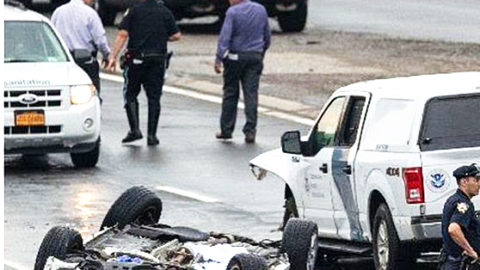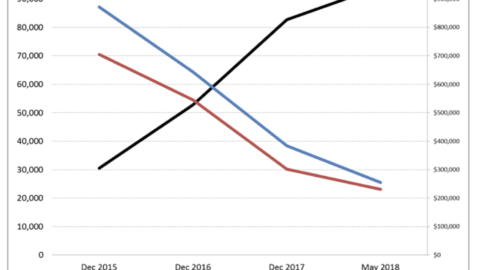Hello everyone and welcome to September! As we break free from these oppressive heat waves and head towards more pleasant weather patterns, it would appear the calmer weather does not make for calmer regulatory waters.
Of course, with another September settling in, we must not forget that this September marks the 17th anniversary of the 9/11 World Trade Center terror attacks. My thoughts and prayers are forever with the victims and their families, and I ask that you keep them in yours, as well. While time continues to pass, and memories of that horrific day may fade, for many, there is a massive amount of pain which never will go away.
On a more uplifting topic, good luck to all those who have begun a new school year! Let’s get right into it.
In my last column, I provided the quick facts on a number of introduced bills which, as of August 8, were approved by the Committee on For-Hire Vehicles, and ready to be signed into law by the Mayor. Signed and enacted into law on August 14, the new rules take aim at a number of issues, primarily focusing on Driver finances, including legislation mandating the TLC to establish a minimum wage for Drivers, waive the licensing fees for WAVs, and lower the financial penalties for the unauthorized solicitation of business by Drivers, more commonly known as “illegal street hails.” Int. 838-B, introduced by FHV Committee Chair Ruben Diaz, Sr. set out to establish a new “sector” of the FHV industry, known as “high-volume for-hire service,” applicable to “…entities that dispatch or facilitate the dispatching of 10,000 trips a day by one or more licensed black car bases, luxury limousine bases or livery base stations through an app or their similar passenger-facing booking tool…” In other words, companies such as Uber and Lyft.
Perhaps the most controversial of the bills-turned-law was Int. 144-A, calling for a 12-month moratorium (cap) on the issuance of new for-hire vehicle licenses (excluding new WAV licenses), while the TLC, in conjunction with the DOT, determines and sets a “vehicle utilization standard.” The goal of setting a vehicle utilization standard is, according to the legislation, to ensure the most “…efficient use of FHVs based on the time spent and/or distance traveled by FHV drivers while transporting passengers or while they are available to accept dispatches from a base; and the number of passengers transported by each driver.”
Prior to the August 8 vote, you may have noticed commercials on cable television put out by Uber to protest the then-upcoming vote, claiming that outer borough residents residing in “transit graveyards,” which are often also communities of color, have grown to depend on such app-based for-hire services in the absence of true mass transit alternatives. The campaign raised the argument that street hail-based services often refuse to accept a hail due to either racial or geographic discrimination and encouraged NYC residents to let their representatives know how they came to depend on the services. While the vote placing a temporary cap on FHV license issuance passed, along with the other bills which made up the package, the 8th also brought us yet another set of council bills.
The 7 bills which make up the new package, introduced on the 8th, aimed primarily at the issue of Driver finances, were referred to the FHV Committee by the council, and are now on calendar for a public hearing on September 17th.
Here is a brief overview:
- 1052 calls on the TLC to conduct a study into the feasibility and costs associated with providing drivers with certain benefits (such as healthcare and disability insurance).
- 1062 aims to ensure both taxi and FHV drivers are paid the full fare amount in the event a digital payment form fails.
- 1068 calls on the TLC to engage in financial education and outreach to drivers, specifically regarding the financial arrangements based around FHVs and medallions.
- 1069 calls on the TLC to study the issue of excessive debt among medallion owners and their declining prices, as well as to report back to the council their recommendations to address the issue.
- 1070 calls on the TLC to initiate rulemaking regarding the financial agreements (e.g. leasing and rental agreements) drivers enter into to obtain FHVs.
- 1079 calls for the establishment of an “Office of Inclusion” within the TLC, tasked with promoting diversity, inclusion, and cultural sensitivity.
- Finally, there is Int. 1080, directing the TLC to establish at least one “driver assistance center” to provide services and information to drivers, including financial counseling, mental health counseling, as well as referrals for additional assistance with relevant non-profit organizations.
Make sure to catch my column in October, as I will be able to provide an update on the bills mentioned above, following the September 17 hearing.
It isn’t just the city council putting forward items requiring our attention, with the TLC releasing its proposed rules regarding driver finances – albeit, the proposed rules were mandated by the Mayor’s enactment of Int. 144-B, reiterating the TLC’s authority to establish a driver pay floor, and 890-B, authorizing the TLC to require certain data from FHV service providers in an effort to provide protections relating to income and financial transparency for both FHV and yellow taxi drivers.
The TLC released a Notice of Public Hearing on these proposed rules, marking October 3, at 10am as the time of the public hearing, with a September 28 deadline to submit written comments. The proposed rules put out by the TLC are quite lengthy, and we are still in the process of reviewing them.
By the time you read my October column, the TLC hearing will have passed, however, I won’t be able to provide an update on the hearing until my November column. As such, make sure you are following the BCAC and The Black Car Fund on social media to stay up on breaking news!
I mentioned this in my last column, but it is such great news, I’m mentioning it again! Last month, The Black Car Fund, in conjunction with the Independent Drivers Guild Benefit Fund, launched an all-new driver vision benefit. Drivers who drive a total of 85 consecutive hours per month with passengers in the car for three consecutive months are eligible for these free benefits. If you are unsure if you are eligible, I encourage you to visit the program website, www.DriversBenefits.org or call 1-833-814-8590.
Within a month or so, we will be rolling out a brand-new van to promote these vision benefits, which will be conducting on-the-spot vision tests! IDG Benefits Fund is also currently working on a benefit management app for drivers to organize and keep track of their many benefits, as I first reported on last month.
That seems to be it for this month! Until next time, drive safely!




